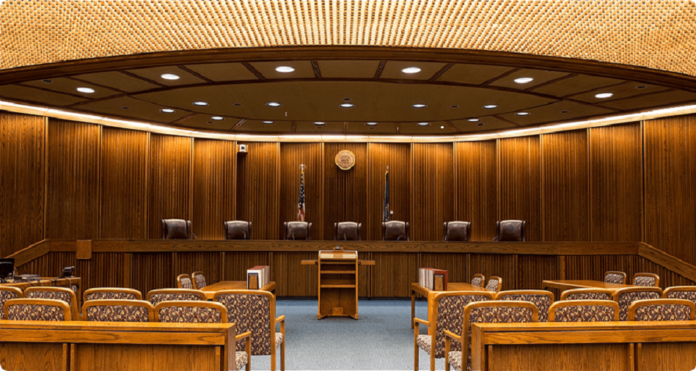Just how secure does your license plate need to be fastened to your car if the police decide to pull you over suspecting that you committed a crime?
Does it have to be firmly attached so it doesn’t shake or flap? Or does it have to be attached in such a way that it doesn’t swing?
It was an issue that a divided state Supreme Court wrestled with in deciding that a loose license plate hanging unevenly gave police reasonable suspicion to make a traffic stop that led to the discovery of drugs, drug paraphernalia and an open container of alcohol.
The discovery led to Tashara Yeargin-Charles being convicted of possession of methamphetamine, marijuana and drug paraphernalia, interference with law enforcement, and transportation of liquor in an open container.
She was sentenced to 20 months in prison that was suspended and 18 months of probation.
Yeargin-Charles tried to suppress the evidence, alleging that law enforcement lacked reasonable suspicion to initiate the traffic stop.
A Jackson County district judge denied the motion, which was upheld by the state appeals court. On Friday, the Supreme Court upheld both lower-court rulings.
The case centered on a traffic stop made in the early morning hours of Aug. 25, 2021, near the intersection of 150th Street and Highway 75 in Jackson County.
While traveling behind a Honda, a Jackson County sheriff’s deputy observed that the vehicle’s license plate was not securely fastened and that it was “slanting to the right, and it was visibly shaking.” The traffic stop was made based on that observation.
While searching Yeargin-Charles’ purse, the deputy discovered an open bottle of peach vodka, a marijuana cigarette and a glass pipe containing residue that later tested positive for methamphetamine.
Yeargin-Charles argued the district court erred in denying her motion to suppress the evidence in the case.
She claimed the deputy did not have the necessary reasonable suspicion to believe the
car’s license plate violated a state law that requires license plates at all times to be securely fastened to the vehicle to keep it from swinging.
However, in a decision written by Justice Melissa Standridge, the court majority determined that failure to securely fasten a license plate to a vehicle constitutes a violation of state law even where visibility and legibility are not in question.
“The uncontroverted testimony of the deputy was that the license plate was ‘loosely secured by a bolt or a screw on the left side in the manufacturer’s hole and was tilted downwards to the right,’ that it was “not secured by anything” on the opposite end, and that the plate was visibly “moving” and “flapping in the wind,'” Standridge wrote.
State law requires license plates to be securely fastened to the vehicle, placed at a height of at least 12 inches from the ground and be clearly visible and legible.
“Non-compliance with any of these requirements may provide reasonable suspicion for law enforcement to initiate a traffic stop,” Standridge wrote.
Because the deputy observed the car’s license plate hanging askew and “flapping in the wind,” he had reasonable suspicion of a violation the law requiring a vehicle’s license plate to be “securely fastened.”
As a result, the appeals court did not err in affirming the district court’s order denying Yeargin-Charles’ motion to suppress the evidence in the case, she wrote.
Standridge said the court’s majority opinion was consistent with federal case law with virtually identical facts.
She cited a 2010 federal case where a highway patrol trooper made a traffic stop in Ellsworth County after observing a suspect license plate “hanging down” on one side of a flatbed truck and that it appeared to be attached by a string or a wire.
The traffic stop in that case led to a search where authorities found a vehicle battery in a tool box. The inside of the battery had been altered to make a secret compartment that contained methamphetamine.
Standridge noted the 10th U.S. Circuit Court of Appeals held that those circumstances provided the trooper with reasonable suspicion of a violating a state law requiring the license plate to be securely fastened.
Justice Caleb Stegall dissented, and he was joined by Justices Eric Rosen and K.J. Wall.
Stegall said the court ignores the license-plate law in its entirety, noting the language specifically says the license plate must “securely fastened” to the vehicle in such a way that is prevented from swinging.
“In other words, the statute defines the degree to which a plate must be ‘securely fastened’ — ‘to prevent the plate from swinging,'” Stegall wrote.
“The majority completely ignores this qualifier embedded in the statute and then bases its evidentiary review on its rewritten requirements,” he wrote.
He said the majority opinion constructs the language in the law requiring the plate to be fastened so it doesn’t swing meaningless.
Stegall agreed there was sufficient evidence to establish reasonable suspicion that the plate was not fastened securely enough to prevent the kind of “shaking,” “flapping,” and “oscillating” in a back-and-forth motion described in testimony.
“But this conclusion is insufficient to establish reasonable suspicion that the vehicle was in violation of the actual text” of the law, he wrote.
Stegall said the officers testified that they had identified the license plate as not being securely fastened before they viewed the vehicle moving.
Once they had flagged the car, they began following it only to view the license plate was “flapping” and “shaking.”
“Nowhere in the record did the officers testify that the plate was ‘swinging,'” he wrote.
“Also, notably absent is any further description of the plate’s movement,” he wrote.
“While not required by statute, such evidence that the plate was moving so much to be illegible or be a potential roadway hazard could support a finding the plate was ‘swinging.’
“Here, officers testified they had no issue reading the plate.”
Stegall said that record “clearly” demonstrated that the license plate in question was securely fastened.
“We abandon our duty of independent review when we simply defer to an officer’s testimony about what counts as “secure” when we decline to enforce the objective standards, words like “secure” become entirely subjective,” he wrote.
“Is a plate with two bolts ‘secure’ if an officer thinks it isn’t? Here the majority runs squarely into the constitutional problem of vagueness we have previously addressed numerous times,” he wrote.
















